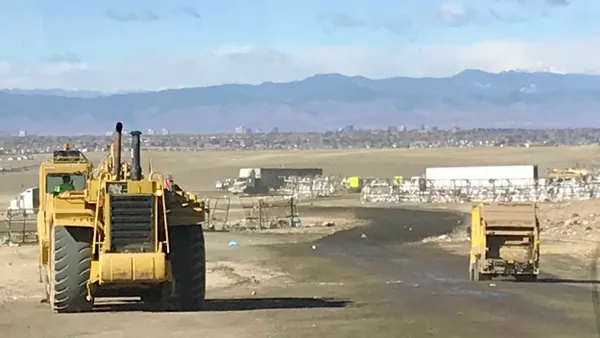CORRECTION: A previous version of this article stated that the Milwaukee Metropolitan Sewerage Commission had given final approval to a contract with Waste Management. The MMSD executed a memorandum of understanding outlining tentative terms for a contract, but did not execute the contract.
Dive Brief:
- The Milwaukee Metropolitan Sewerage Commission executed a memorandum of understanding outlining the terms of a potential 20-year agreement with Waste Management to use biogas from the company's Metro landfill in Franklin, WI, as reported by the Milwaukee Journal Sentinel.
- Under the proposal, the Milwaukee Metropolitan Sewerage District (MMSD) would construct a $11 million gas treatment plant at the landfill. Waste Management would maintain its gas extraction system and build a pipeline to the Emerald Park Landfill operated by Advanced Disposal. From there, the gas would be transported to the MMSD's Jones Island water treatment facility for use in powering the plant and drying sludge into Milorganite fertilizer.
- MMSD expects to save ratepayers $10 million over the 20-year period, with plans to begin using the gas by mid-2019. This agreement is dependent on Waste Managment receiving approval from the state's Department of Natural Resources for a landfill expansion.
Dive Insight:
The news comes nearly one year after MMSD approved a similar agreement with Waste Management that was delayed by "additional engineering information and continued negotiations." Since then, projected costs for the gas treatment facility have increased and the amount that MMSD will pay Waste Management has decreased. Under the newly proposed terms, the company would now receive 36% of market price for the gas by volume, as compared to the previously proposed 45%, and the minimum price will be $1 per dekatherm instead of $1.50.
A similar contract was initiated with Advanced Disposal in 2014, but the company's Emerald Park site hasn't been producing as much gas as expected, so MMSD sought a secondary source. Waste Management had already been capturing the gas to sell for electricity since 1985 and is eventually expected to provide more gas than Advanced once the new system is fully operational.
Landfill biogas continues to be a prime target for renewable energy creation — and additional revenue — as companies look for ways to get more value out of the methane being produced. In a parallel trend, water treatment facilities are also starting to become more integrated into municipal waste management systems as a potential option for co-digesting food scraps. Unrelated to the MMSD project, Milwaukee started its own curbside organics collection program earlier this year and is composting the material at a local site.










